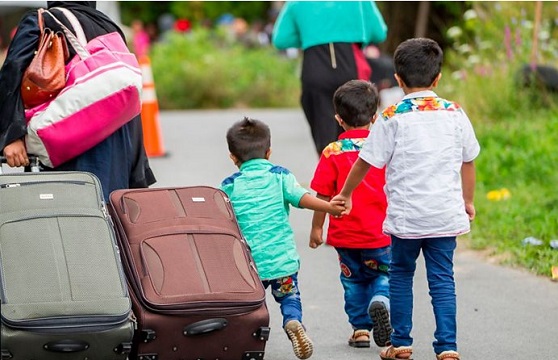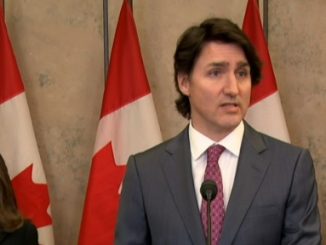
Canada’s Supreme Court will for the first time hear a Canada-US asylum pact case that will weigh whether the country can consider its southern neighbour “safe” for those seeking refugee status.
The outcome of Thursday’s hearing could determine whether Canada can trust that the US treats migrants properly, and could answer whether Canada holds any responsibility for migrants turned back at its border.
At the heart of the matter is the Safe Third Country Agreement (STCA) – a pact between the two countries that has been in place since 2004 and that requires refugee claimants to request protection in the first “safe” country they reach.
Campaigners in Canada have long argued that the STCA should be struck down because migrants are at risk of mistreatment in the US and that the agreement violates their constitutional rights.
Refugee lawyers and advocates say some of migrants that were sent back were imprisoned in “freezing cold” detention centres or subject to solitary confinement.
Experts say the case could also determine the future of “irregular” land crossings into Canada, which reached a record high this year.
Canada and the US share a 5,525 mile (8,891 km) border – the longest between two countries in the world.
What is the Safe Third Country Agreement?
The STCA was put in place to better manage refugee claims at the US-Canada land border and to avoid asylum seekers making claims in multiple countries, or so-called “asylum shopping”.
The agreement applies to almost all refugee claimants coming through the US, except if they have a family member in Canada or if they are an unaccompanied minor.
The US is the only nation designated as a “safe third country” by Canada – a designation based, in part, by Ottawa’s belief that the US meets a high standard in protecting human rights.
Canadian campaigners issued their first legal challenge to the STCA in 2005, shortly after it was signed.
A judge ordered the STCA to be struck down three years later, arguing Canada had “failed” to continuously review whether the US was safe for asylum seekers.
That decision was overturned after a successful appeal by the federal government.
Advocates launched a new legal challenge in 2017 after the election of former president Donald Trump, who promised a crackdown on immigration.
They provided evidence of migrants who had been subject to detention in the US, with some saying they were also not given access to speak with a lawyer.
The challenge was successful, and the safe country agreement was nearly scrapped again in 2020 after a federal court ruled it unconstitutional due to the possibility that the US will imprison migrants.
Ottawa appealed and was again successful, with the appellate court arguing, in part, that there wasn’t enough evidence to prove widespread systemic problems with how the US treats migrants.
The case is now before Canada’s highest court.
Asylum seekers still cross into Canada from the US
Many asylum seekers cross the border into Canada through “irregular” means – outside of official border entries to avoid being turned back.
Crossing between border points allows asylum seekers to circumvent the agreement and apply for asylum once they are on Canadian soil.
A large number cross at Roxham Road – a dead-end rural road in upstate New York between the province of Quebec and the US state.
The road made international headlines in August 2017 after more than 3,800 asylum seekers attempted to cross into Canada in the first two weeks of the month. At the time, many of them were Haitians who feared deportation after the Trump administration announced plans to end a humanitarian programme that temporarily allowed them to stay in the US following the devastating earthquake in Haiti in 2010.
“Irregular” crossings into Canada dropped during the pandemic but have risen since. They have reached a six-year high with more than 23,300 people arriving between January and August.
A parliamentary committee has said it will look into the costs.
Audrey Macklin, professor and chair of Human Rights Law at the University of Toronto, said she believes the STCA has allowed irregular points of entry like Roxham Road to flourish by pushing asylum seekers towards the makeshift entry points.
Ms Macklin said she believes that if the Supreme Court strikes down the agreement, “it would have the immediate effect of drying up irregular entries”.
The case could also determine what is considered enough proof in the eyes of Canadian courts for the breach of constitutional rights, Ms Deshman said.
She said if the evidence already put forward is considered insufficient in showing “that there is a real risk of abuse for the people who have turned back at the Canadian border, I frankly don’t know what type of evidence you’d be able to bring”.
Ahead of Thursday’s hearing, the Canadian government has maintained its support of the asylum pact.
In a statement to the BBC, Immigration and Citizenship Canada said the agreement “has been an important tool” to ensure orderly processing of asylum claims at the border.
“Canada believes that the STCA remains a comprehensive means for the compassionate, fair, and orderly handling of asylum claims in our two countries.”
US officials contacted by the BBC did not respond to requests for comment.
If the advocates fail in their bid to scrap the agreement, Ms Deshman they’d be disappointed, but likely won’t give up their opposition.
“I think it would send people back to the drawing board … but it wouldn’t be the end of the road,” she said.
Source: bbc.co.uk






Be the first to comment